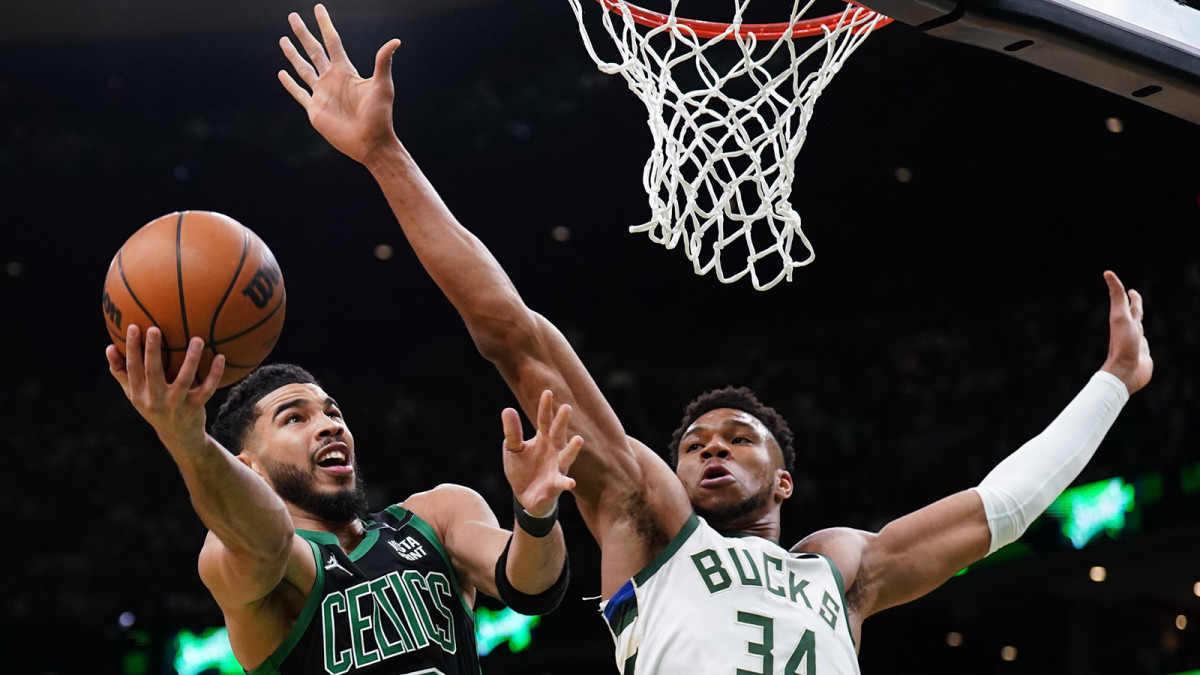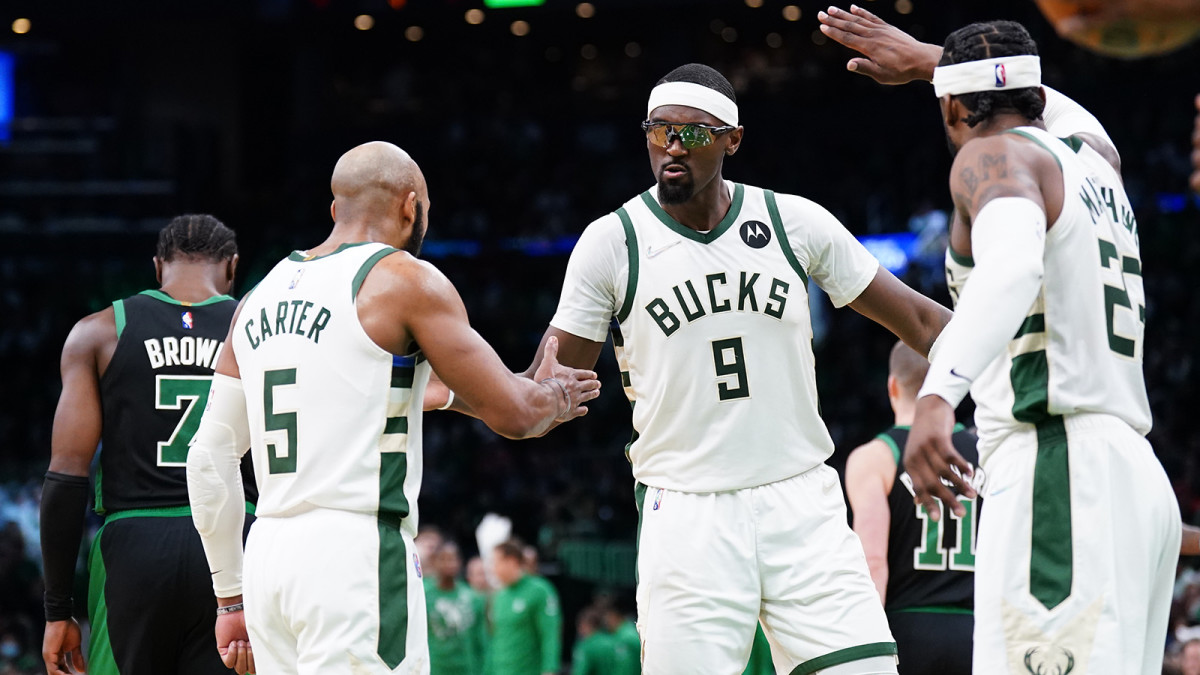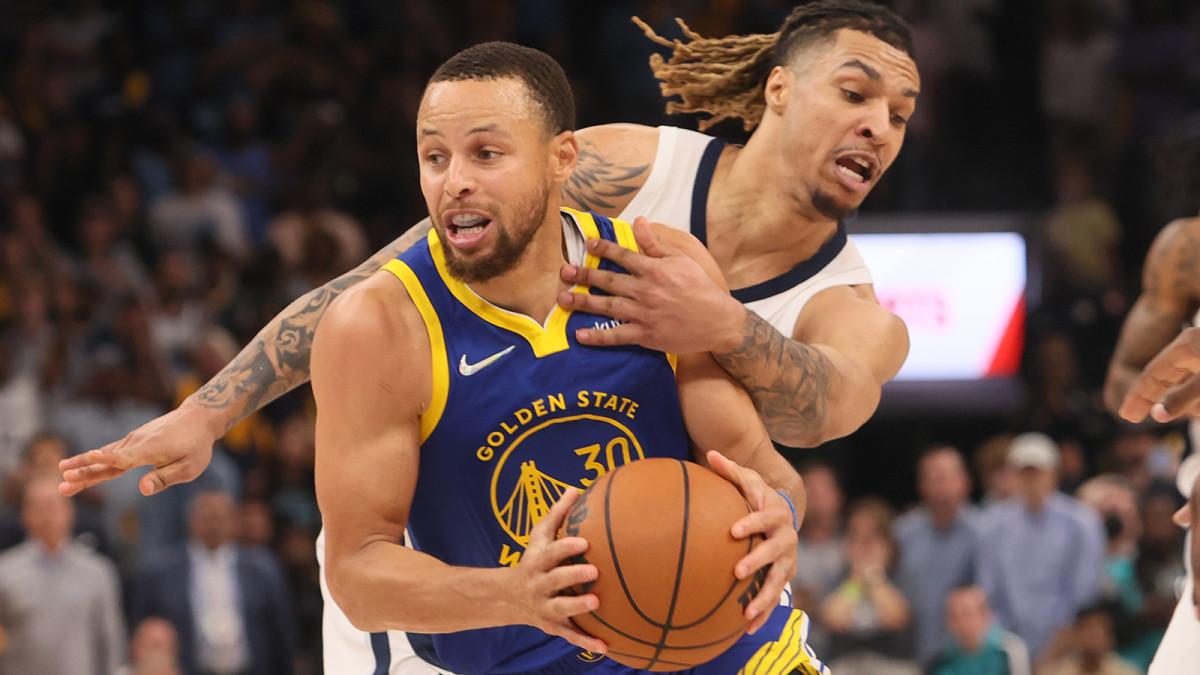How the Bucks Are Clamping Down on the Celtics

After all this time, perhaps many of us simply forgot.
The Bucks led the NBA in defensive efficiency during the 2018–19 season, then earned the distinction again in 2019–20. After a dropoff to ninth-best during the 2020–21 regular season, Milwaukee clamped down when it mattered most, not only finishing with the league’s stoutest defense last postseason, but also winning the club’s first NBA championship in 50 years.
So, this season, with the Bucks falling to a pedestrian 14th in defensive efficiency—and ranking just 19th since January 1—it might have been fair to wonder whether Milwaukee’s iron curtain had curtailed some. Yet as we head into Game 2 of Bucks-Celtics, we’re talking again about how solid Milwaukee’s stoppers looked; it’s a key shift away from the conversations about Boston, which largely shut down Kevin Durant and Kyrie Irving in the first round after finishing statistically as the league’s best defense this year.
The impetus behind it all is that the Bucks have what the Nets did not: defensive discipline, length and deterrence around the basket, which prompts even the most skilled opposing scorers to second-guess themselves when looking to make a play.

Celtics stars Jayson Tatum and Jaylen Brown were more or less fine from the perimeter, connecting on almost 39% of their 18 combined tries from deep in Game 1. But Tatum and Brown—forced by Milwaukee to drive toward their left hands—had no answer when they dribbled in closer to the basket. Neither did their teammates. All told, the Celtics made just 10 two-point baskets and flirted with the record for fewest two-pointers ever in a playoff game. (The record is nine, whereas Boston finished with 10 by making a couple in garbage time.)
The Bucks accomplished this with a few different principles. Coach Mike Budenholzer, a longtime fan of angling star scorers away from their dominant hand, had players like Grayson Allen and Bobby Portis digging and helping down closer to the paint as drives took place, which often would leave the primary defender with at least two stoppers coming over to help—one in front and one directly behind or to the side of the ballhandler. In many cases, one of those defenders was Giannis Antetokounmpo, the two-time MVP and one-time Defensive Player of the Year, who owns a 7'3" wingspan. The other backstop was generally center Brook Lopez, whose return to the lineup following midseason back surgery has largely allowed Milwaukee to regain its dominance on D.
This is such a good defensive possession for the Bucks. Brook is in drop and forces Tatum to kick out. Giannis is also at the rim because Bucks are leaving Grant open. Wesley Mathews rotates out and the Brook does forcing the drive. Giannis contests at the rim pic.twitter.com/owt3E2ezdM
— Joe Jackson (@joejacksonCBB) May 2, 2022
Boston shot just 3-for-20 Sunday when Antetokounmpo and Lopez were the ones contesting shots, according to ESPN Stats & Information. The Celtics were even worse—1-for-15—when launching twos with Giannis and Lopez in proximity of the shot. With a lid on the basket during the time Lopez and/or Antetokoumpo were defending, Boston tried its hand at the longball often, tying its regulation season-high by taking 50 triples. But much like the Bulls, who launched a season-high 52 in their series-ending loss to the Bucks, taking that many threes played into Milwaukee’s strategy: to make an ancillary player win the game from the arc.
On Sunday, that player was Al Horford. The Boston big man got the first shot of the game for the Celtics and would go on to take five of the club’s first 10 shots in the contest, even though he finished a career-low 14.8% of his team’s possessions throughout the season. Portis, in the Milwaukee starting lineup with All-Star Khris Middleton out, was playing away from Horford to offer more resistance if and when Tatum and Brown sought to get to the cup.
Even as Horford finished 4-for-9 from the three-point line, the decision paid off for the Bucks. Horford seems far less likely to tip the scales with his playing style—even if left wide open—than Tatum or Brown would if they got the looks they’re accustomed to. As such, Boston coach Ime Udoka told his players they don’t need to take contested threes, since Milwaukee is more than willing to surrender open ones when the Celtics rotate the ball.

Still, there was great attention to detail from the Bucks, who weren’t relying on the same-old loose, drop coverage on screen and rolls that we’ve often seen them use with Lopez before. Lopez was working hard, coming all the way up to the three-point line at times to allow less space for Tatum as he came around picks. Portis, not known for his defensive chops, showed great hustle, too. (It also helps quite a bit to have an All-Defensive-Team-caliber guard in Jrue Holiday and a tough, seasoned vet like Wesley Matthews chasing Boston’s wings around.)
It all made for a stark contrast from the last round for the Celtics, who got a whopping 38% of their shot attempts from six feet or closer against Brooklyn; the second-highest rate among playoff teams in that opening round. On the flip side, Milwaukee—which utilized a similar, walled-off style to seal the paint against Chicago’s DeMar DeRozan and Zach LaVine—surrendered the second-lowest percentage of shots near the rim in the first round.
The display was an interesting response to the “How can Milwaukee make up for Middleton’s scoring?” question. If the Bucks defend anywhere near this well the rest of the series, big scoring outputs likely won’t be as necessary.
“The activity everywhere was good,” Budenholzer said after Game 1. “Giannis, Brook, Bobby, those guys really happened to do both things [Sunday]: play the paint and play the three-point line. And the guards sealed off penetration and limited opportunities. Defensively, the edge and focus was appropriate, and now we’ve just gotta do it again Tuesday.”
It was such a good performance on that end that it’s hard to imagine the Bucks would want to change a whole lot heading into Game 2. Boston, clearly, is the team needing to throw in some wrinkles, which puts Udoka, the rookie head coach, in an interesting spot, to see how he can go about countering Milwaukee’s plan to essentially force Horford into a bigger role.
Meat and potatoes: Good SI reads and listens from this past week
- Staying with the Bucks-Celtics series, Chris Mannix wrote about how Giannis and Milwaukee picked apart the vaunted Boston defense at times, even without Antetokounmpo having the most efficient game from a scoring standpoint.
- Michael Pina touched on the importance of Bucks guard Jrue Holiday tapping into his isolation offense in this matchup—a need for Milwaukee, given Middleton’s absence.
- Pina also tackled the three biggest takeaways from Game 1 of Sixers-Heat, beginning with the most obvious issue that’s plaguing Philly: With Joel Embiid out and Paul Reed in clear foul trouble, Doc Rivers and the Sixers would likely be better off going smaller than continuing to go with creaky big man DeAndre Jordan. (They’d also be better off if Georges Niang shoots better than 0-for-7 from deep.) The analysis was similar to what Rohan Nadkarni suggested in the first few hours after Embiid’s stunning injury was announced.
- Howard Beck and Mannix recorded a pod yesterday digging into the question of playoff officiating in the aftermath of the polarizing Flagrant 2 call against Draymond Green in Game 1 of the Western Conference semifinals.
- Nadkarni also wrote an interesting piece on why not to blow up the disappointing Jazz, and a separate one on what comes next for the Hawks. Similarly, I wrote about what the Bulls need to prioritize from a roster standpoint this offseason, beyond the notion of locking in LaVine, who’s set to become an unrestricted free agent. Pina wrote on the seemingly promising future of the Timberwolves, even after their frustrating end to the playoffs against the Grizzlies.
- I raised a question that seems difficult to answer for now, in light of what’s happening in Brooklyn: What is KD most hoping to accomplish over these next few years, and is he in the right place to do it?
- Mannix had a story on one of the better comeback efforts this past year: Boogie Cousins in Denver. In opening up with Mannix, Cousins said he considered retiring during the arduous road back.
Memphis is talented enough to hang with the Warriors, but it lacks focus on D

For all the focus on the Warriors’ shooting ability—and just in case you’ve been unplugged from the sport for a while, there’s even more of it now than there was before—the team doesn’t get quite enough credit for how it makes hay with the threat of the longball.
Drilling down more specifically, Golden State has teams so afraid of its three-point flair that it can generally back-cut them to death, quietly sneaking behind the defense into the paint while opposing wings are overly focused on what’s happening out in front of them.
The Warriors, who’ve utilized perhaps the most beautifully chaotic offense in recent memory, have long been pros at this. Stephen Curry’s shooting helps open things up, but his willingness to serve as an off-ball screener makes it an even more challenging task to guard such an unscripted style of play. Draymond Green’s passing ratchets up the pressure, as does Klay Thompson’s sharpshooting. And having a player like Jordan Poole seemingly makes things unfair again, in the way it was during those years when Durant was a Warrior.
On some level, though, that’s something worth watching in this semifinal series with Memphis. For as talented as the Grizzlies are, with an offense that can go toe-to-toe with Golden State, they at times lack the defensive discipline necessary to lock down a team that plays this way.
The Warriors, who closed out possessions with cuts nearly twice as often as the average NBA team during the regular season, finished 17 such plays that way in Game 1 with Memphis. Hell, in the second quarter alone, Golden State had seven plays that ended with cuts—as many as the Grizzlies’ offense produced all game. (And the Warriors scored on six of those seven possessions.) For the game, Golden State essentially converted on 13 of its 17 plays stemming from a back-cut, according to Synergy Sports.
This is maybe the place where a young club like Memphis is most in a bind, trying to pay full attention to the Warriors’ shooters while not losing sight of whoever might be creeping behind for an open layup or dunk. It feels like death by a thousand cuts when the concern over Curry, Poole and Thompson leaves you getting beat at the rim by a wide-open nonshooter like Gary Payton II. That was the case in a key sequence with less than two minutes to play, with the Grizzlies’ defense preoccupied.
Memphis is talented beyond its years. But the decision-making and focus can lack at times.
Jaren Jackson Jr. was in the conversation for Defensive Player of the Year, finishing fifth in the voting. But for all the good he does, he frequently lands in foul trouble still. The same is true of Dillon Brooks, a highly active wing defender who helped limit Curry to 0-for-7 shooting Sunday when serving as the primary defender on the two-time MVP. He’s had five fouls or more in four of the Grizzlies’ seven postseason contests thus far. And none of this even touches on Ja Morant, who is incredibly slight, often unable to stay with his man and at times targeted on defense because of his perceived shortcomings there. Trying to stay tethered to Poole, Morant was the one who got back-cut by Payton with 1:35 left to tie the contest at 114.
The Grizzlies can inflict some damage on Golden State in this series. But if they can’t properly identify when and where the Warriors are cutting, it may not be as entertaining a matchup as folks are hoping for.
Thanks for reading The Playmaker. Feel free to forward this email to a friend or tell them to sign up at SI.com/newsletters. If you have any specific questions, just reply to this email or send a note to nba@si.com and I may answer it in a future edition.
